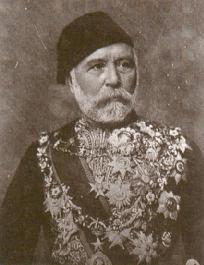Mohamed Sherif Pasha facts for kids
Quick facts for kids
Mohamed Sherif
محمد شريف |
|
|---|---|
 |
|
| 3rd Prime Minister of Egypt | |
| In office 7 April 1879 – 18 August 1879 |
|
| Monarch | Isma'il Pasha |
| Preceded by | Tewfik Pasha |
| Succeeded by | Tewfik Pasha |
| In office 14 September 1881 – 4 February 1882 |
|
| Monarch | Tewfik Pasha |
| Preceded by | Riaz Pasha |
| Succeeded by | Mahmoud Samy el-Baroudy |
| In office 21 August 1882 – 7 January 1884 |
|
| Monarch | Tewfik Pasha |
| Preceded by | Isma'il Raghib Pasha |
| Succeeded by | Nubar Pasha |
| Personal details | |
| Born | February 1826 Kavala, Ottoman Empire |
| Died | 20 April 1887 (aged 61) Graz, Austria-Hungary |
| Parents | Muhammad Said, Kadi of Mecca |
Mohamed Sherif Pasha (1826–1887) was an important Egyptian statesman. He served as the Prime Minister of Egypt three different times. He worked to guide Egypt during a time of big changes.
Contents
Life of Mohamed Sherif Pasha
Early Life and Career
Mohamed Sherif Pasha was born in February 1826 in Kavala. At that time, Kavala was part of the Ottoman Empire. Today, it is in northern Greece.
He was well-educated, more so than many people of his time. He held many important jobs under leaders like Sa'id Pasha and Isma'il Pasha.
He married the daughter of a French officer named Colonel Sèves. This officer later became known as Suleiman Pasha in Egypt. Mohamed Sherif Pasha and his wife were the grandparents of Queen Nazli of Egypt.
Becoming Prime Minister
Mohamed Sherif Pasha served as Prime Minister of Egypt three times:
- His first time was from April 7, 1879, to August 18, 1879.
- His second time was from September 14, 1881, to February 4, 1882.
- His final term was from August 21, 1882, to January 7, 1884.
As the minister of foreign affairs, he helped Isma'il Pasha. He was known for being friendly and easygoing. He often tried to keep things as they were, preferring not to make big changes.
He believed that Egypt was very strong and stable. He would sometimes point to the Pyramids as proof of Egypt's lasting power.
Challenges and Resignations
In September 1881, there was a military uprising led by Urabi Pasha. The ruler of Egypt, Khedive Tawfiq, asked Sherif Pasha to form a new government.
However, it was hard to agree on how to manage Egypt's money. The Egyptian people had certain financial needs. But British and French officials, who oversaw Egypt's public debt, had different demands. Because of these disagreements, Sherif Pasha resigned in February 1882.
After the Urabi Revolt was put down, Khedive Tawfiq asked Sherif Pasha to be Prime Minister again in August 1882. But in January 1884, he resigned once more. This was because he did not want to agree to leave the Sudan region.
At that time, a movement led by a religious leader called the Mahdi was growing in Sudan. Sherif Pasha did not fully understand how strong this movement was. When asked to give up parts of Sudan, he famously said, "We'll talk about that later; first we're going to give this gentleman a good thrashing." Soon after, an Egyptian army led by Hicks Pasha was defeated in Sudan.
Mohamed Sherif Pasha passed away in Graz, Austria-Hungary, on April 20, 1887. He was 61 years old.
 | Ernest Everett Just |
 | Mary Jackson |
 | Emmett Chappelle |
 | Marie Maynard Daly |

